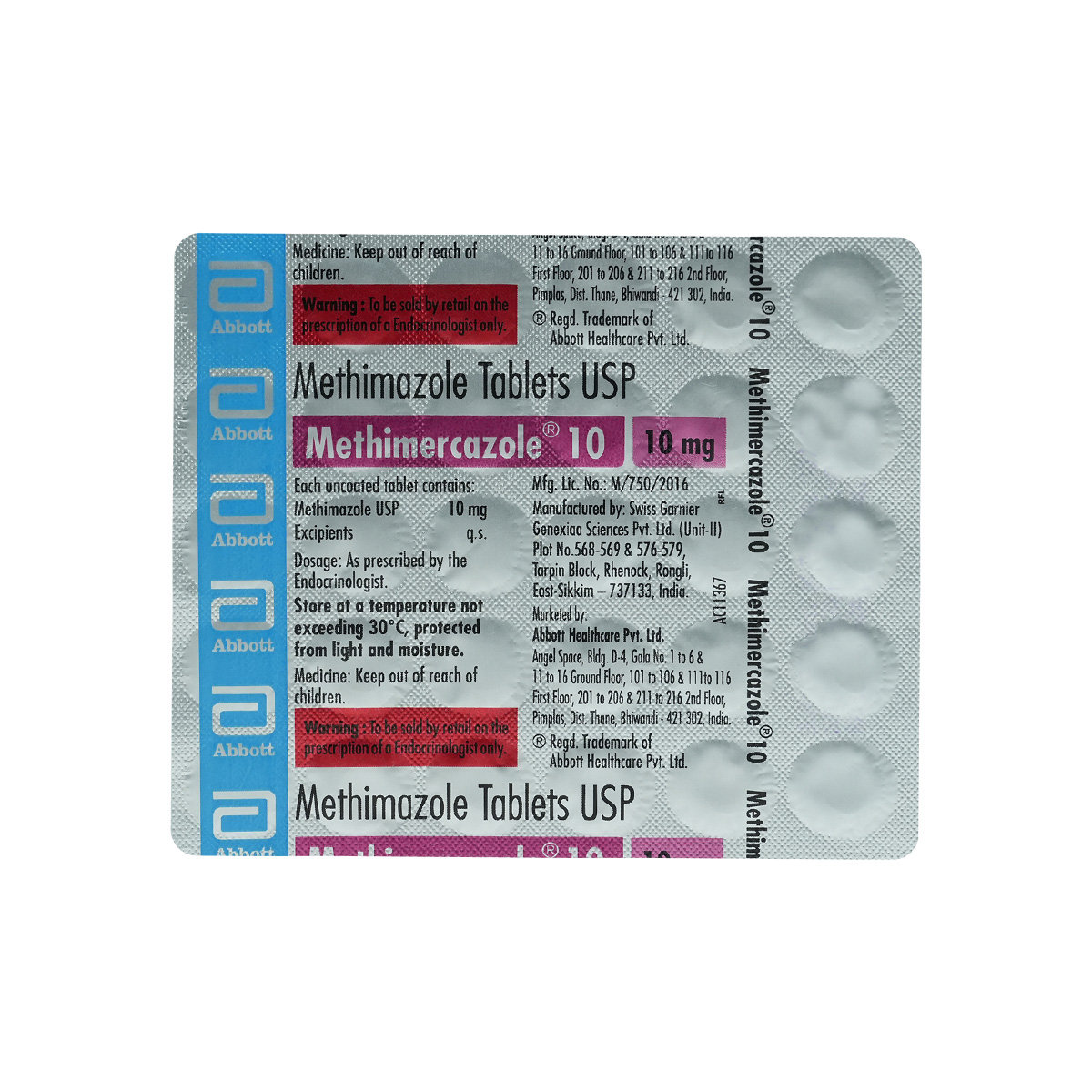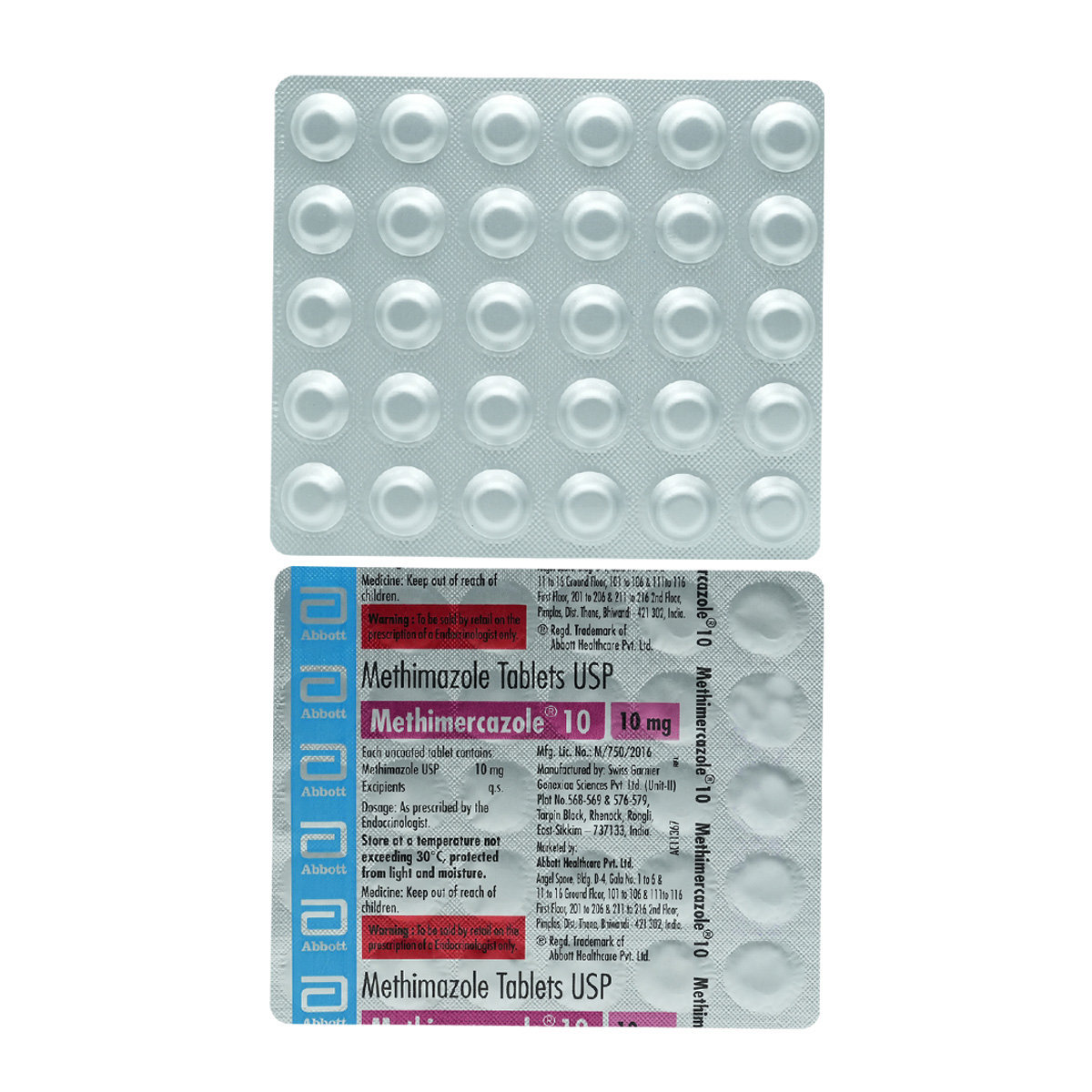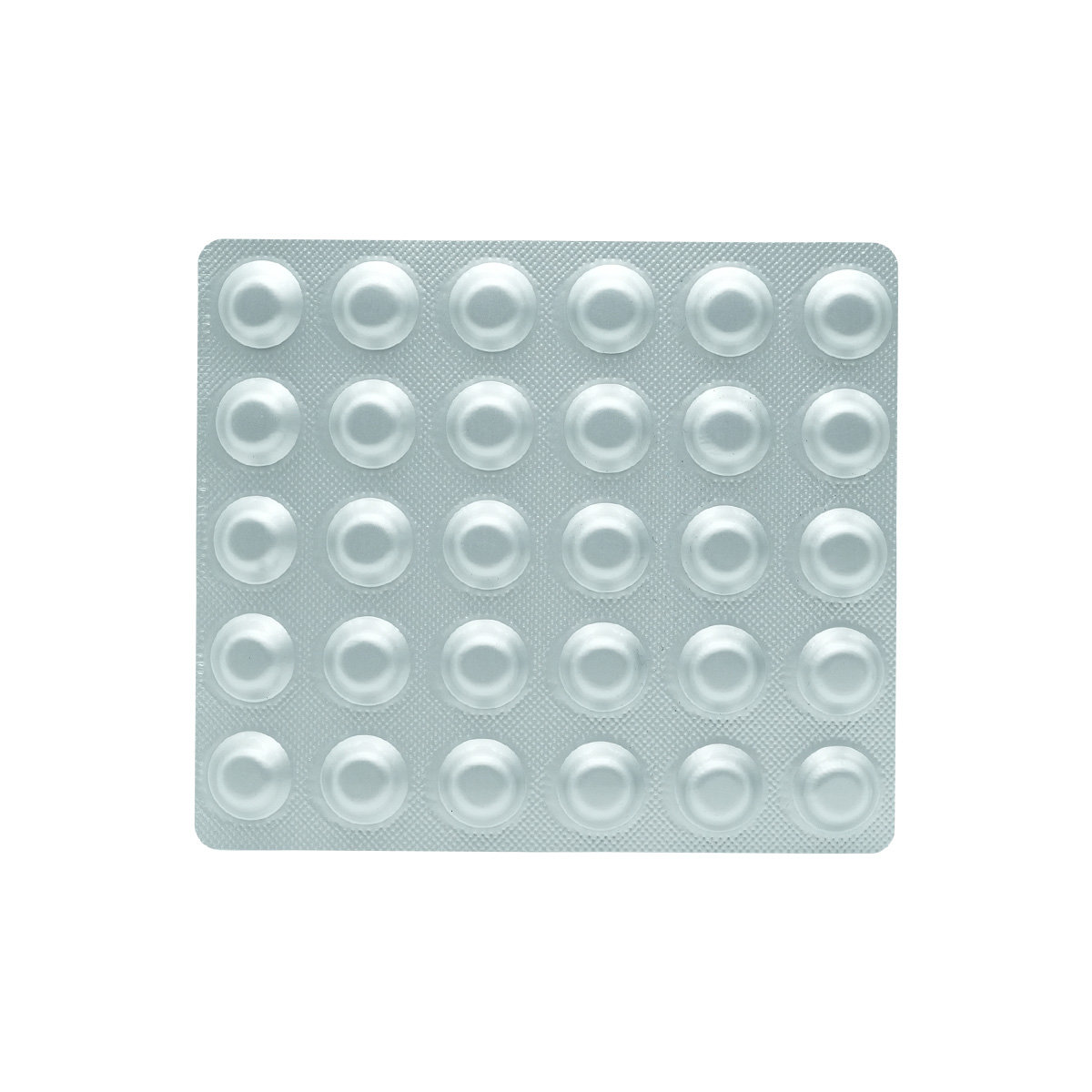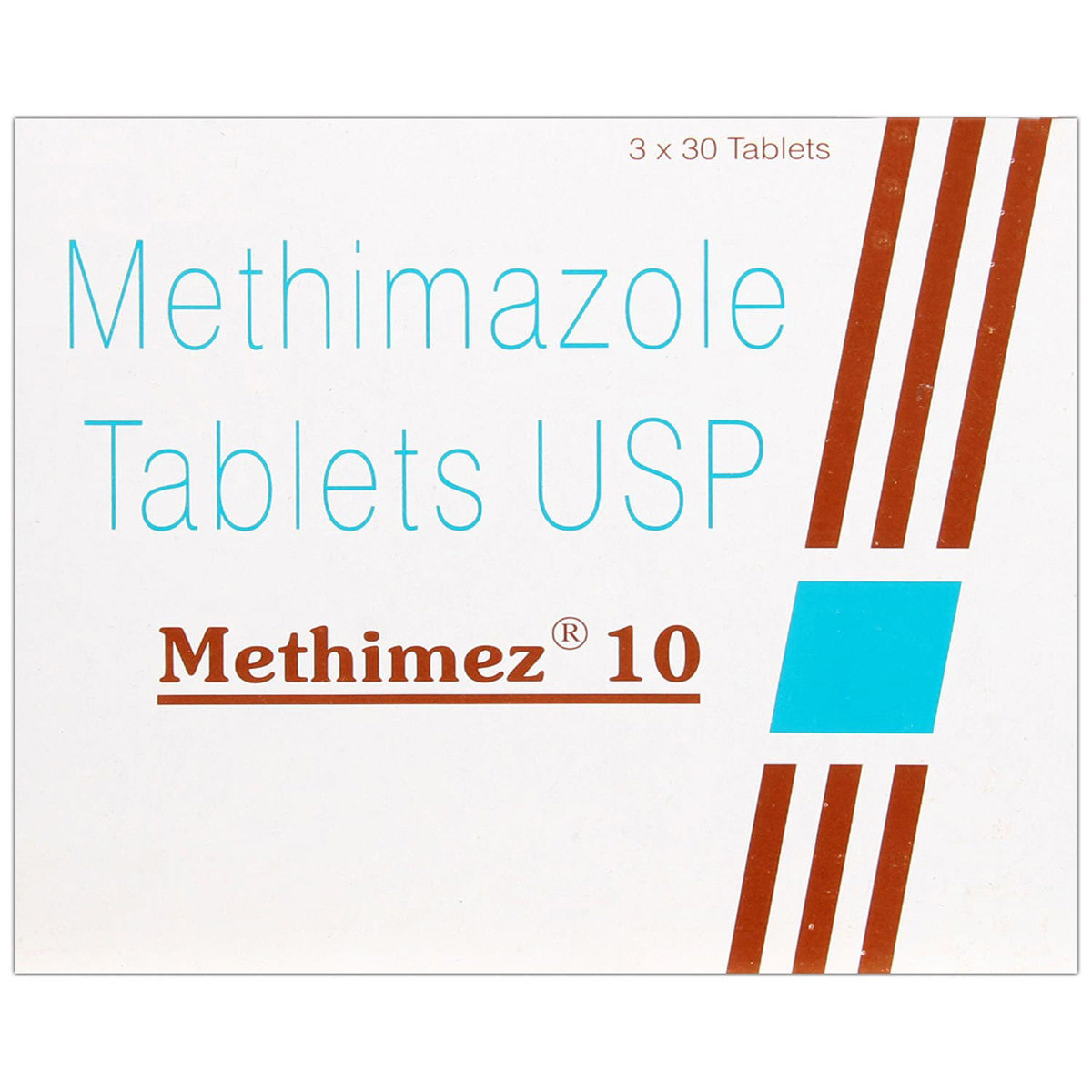Methimercazole 10 Tablet 30's
MRP ₹371
(Inclusive of all Taxes)
₹55.6 Cashback (15%)
Provide Delivery Location
Online payment accepted
 Prescription drug
Prescription drugWhats That
Composition :
Manufacturer/Marketer :
Consume Type :
Expires on or after :
Return Policy :
About Methimercazole 10 Tablet
Methimercazole 10 Tablet belongs to the class of ‘anti-thyroid agents,’ primarily used to treat an overactive thyroid (hyperthyroidism) and Graves disease. Methimercazole 10 Tablet is also used before thyroid surgery and radioactive iodine treatment. Hyperthyroidism is a condition associated with too much production of a hormone called thyroxine by the thyroid gland. The thyroid gland is a butterfly-shaped endocrine gland located in the base of your neck. Graves disease is an autoimmune disorder that causes hyperthyroidism.
Methimercazole 10 Tablet contains ‘Methimazole’ that belongs to the class of ‘Anti-thyroid agents’. It is considered a first-line medicine for treating hyperthyroidism and Graves disease. Methimercazole 10 Tablet works by reducing the excessive production of thyroid hormones from the thyroid gland, thereby preventing hyperthyroidism symptoms.
Your doctor will advise the appropriate dose that suits your medical condition. Common side effects of Methimercazole 10 Tablet include headache, stomach upset, nausea, vomiting and mild skin rash or itching. These side effects may not occur in every patient using this medication and differ individually. If the side effects persist longer or worsen, please seek a doctor’s advice.
Let your doctor know if you are sensitive to Methimercazole 10 Tablet or any other medications. Before using Methimercazole 10 Tablet , let your doctor know if you have liver, kidney or heart diseases, blood disorders and any other medical history. Methimercazole 10 Tablet is not recommended during the first three months of pregnancy. Methimercazole 10 Tablet passes into the breast milk. It is advised that pregnant and breastfeeding women should consult their doctor before using Methimercazole 10 Tablet . Methimercazole 10 Tablet is recommended for use in children only with a doctor’s advice.
Uses of Methimercazole 10 Tablet
Directions for Use
Key Benefits
Methimercazole 10 Tablet is an ‘anti-thyroid agent’, containing ‘Methimazole’. It is used to treat an overactive thyroid (hyperthyroidism) and Graves disease. Methimercazole 10 Tablet is also used before thyroid surgery and radioactive iodine treatment. It treats hyperthyroidism by inhibiting the synthesis of thyroid hormones from the thyroid gland. Methimercazole 10 Tablet is also used in patients with toxic multinodular goitre (an enlarged thyroid gland that contains masses called nodules with hypothyroidism symptoms) for whom surgery and radioactive iodine treatments are not an option. It also relieves hypothyroidism symptoms in preparation for thyroidectomy (surgical removal of whole or part of the thyroid gland) or radioactive iodine therapy.
Storage
Drug Warnings
Let your doctor know if you are sensitive to Methimercazole 10 Tablet or any other medications. Before using Methimercazole 10 Tablet , let your doctor know if you have any medical history of liver or kidney diseases, congenital disorders (birth defects), hypothyroidism (low levels of thyroid hormones), blood disorders like agranulocytosis (lowered white blood cell count) and thrombocytopenia (low levels of platelets) and pancreatitis (inflammation of the pancreas, an organ behind the stomach). Please inform your doctor if you have any scheduled surgery while using Methimercazole 10 Tablet . Pregnant and breastfeeding women should consult their doctor before starting Methimercazole 10 Tablet . You may feel sleepy or dizzy while using Methimercazole 10 Tablet , hence do not drive or operate machinery until you are mentally alert. Limit your alcohol consumption during a course with Methimercazole 10 Tablet . Methimercazole 10 Tablet is recommended for use in children only with a doctor’s advice.
Drug-Drug Interactions
Drug-Drug Interactions
Login/Sign Up
Taking Methimercazole 10 Tablet with Deferiprone may increase the risk of severe infections.
How to manage the interaction:
Taking Methimercazole 10 Tablet with Deferiprone together can possibly result in an interaction, but it can be taken if a doctor has advised it. If you're having any of these symptoms - like fever, chills, diarrhea, sore throat, muscle aches, shortness of breath, weight loss, pain, or burning during urination - contact a doctor immediately. Do not discontinue any medications without consulting a doctor.
The combined use of Mipomersen and Methimercazole 10 Tablet together can increase the liver problems.
How to manage the interaction:
Although there is a possible interaction between Methimercazole 10 Tablet and Mipomersen, you can take these medicines together if prescribed by a doctor. If you have any of these symptoms, contact a doctor immediately: fever, chills, joint pain, swelling, bruising, skin rash, itching, loss of appetite, fatigue, nausea, vomiting, bleeding, pain, dark urine, or liver damage. Do not stop using any medications without talking to a doctor.
The combined use of Methimercazole 10 Tablet with Teriflunomide can increase the risk of liver problems.
How to manage the interaction:
Taking Methimercazole 10 Tablet with Teriflunomide together can possibly result in an interaction, but it can be taken if a doctor has advised it. If you have any of these symptoms, it's important to contact a doctor right away: fever, chills, joint pain, swelling, bruising, skin rash, itching, loss of appetite, fatigue, nausea, vomiting, abdominal pain, dark-coloured urine, liver damage, or bleeding. Do not discontinue any medications without consulting a doctor.
When Clozapine is taken with Methimercazole 10 Tablet, the effects of Clozapine increases.
How to manage the interaction:
There may be a possibility of interaction between Methimercazole 10 Tablet and Clozapine, but it can be taken if prescribed by a doctor. If you have any of these symptoms - feeling weak, having a sore throat, fever, mouth sores, feeling tired or having flu-like symptoms, contact a doctor right away. Do not stop using any medications without a doctor's advice.
Co-administration of Fluphenazine and Methimercazole 10 Tablet together can cause the risk of neutropenia leading to serious infections.
How to manage the interaction:
Although there is a possible interaction between Methimercazole 10 Tablet and Fluphenazine, you can take these medicines together if prescribed by a doctor. If you notice any of these signs - fever, chills, body aches, sore throat, coughing, breathing difficulties, mouth ulcers, or flu-like symptoms - contact a doctor right away. Do not stop using any medications without talking to a doctor.
Taking Lomitapide and Methimercazole 10 Tablet together can increase the risk of liver problems.
How to manage the interaction:
Although taking Methimercazole 10 Tablet and Lomitapide together can evidently cause an interaction, it can be taken if a doctor has suggested it. If you have any of these symptoms, contact a doctor immediately: fever, chills, joint pain, swelling, bruising, skin rash, itching, loss of appetite, fatigue, nausea, vomiting, abdominal pain, bleeding, dark urine, or liver damage. Do not stop using any medications without a doctor's advice.
Taking Propylthiouracil with Methimercazole 10 Tablet can increase the risk of side effects.
How to manage the interaction:
Co-administration of Propylthiouracil with Methimercazole 10 Tablet can possibly result in an interaction, but it can be taken if your doctor has advised it. Do not discontinue any medications without consulting a doctor.
Drug-Food Interactions
Drug-Food Interactions
Login/Sign Up
Diet & Lifestyle Advise
- Take the medication as directed by the doctor and at regular intervals if you take Methimercazole 10 Tablet for more than once per day. Avoid or limit the intake of alcohol and caffeine.
- Manage stress, eat healthily, drink plenty of water, exercise regularly and get plenty of sleep.
- Maintain a fibre-rich diet and include healthy carbohydrates from fruits, vegetables and whole grains.
- Eat at regular intervals.
- Follow a low-sodium diet by limiting iodized salt, seafood, dairy products, high amounts of poultry or beef, high amounts of grain products like bread, pasta and pastries and egg yolks.
Side Effects of Methimercazole 10 Tablet
- Headache
- Stomach upset
- Nausea
- Vomiting
- Mild skin rash or itching
- Abnormal hair loss
- Loss of taste
- Abnormal sensations (tingling, prickling, burning, tightness, and pulling)
- Swelling
- Joint and muscle pain
- Drowsiness
- Dizziness
- Decreased platelet count (thrombocytopenia)
Habit Forming
Therapeutic Class
All Substitutes & Brand Comparisons
RX
Methimez 10 Tablet 30's
Sun Pharmaceutical Industries Ltd
₹358.5
(₹10.76 per unit)
3% CHEAPER
Author Details
We provide you with authentic, trustworthy and relevant information
Drug-Diseases Interactions
Drug-Diseases Interactions
Login/Sign Up
FAQs
Drug-Drug Interactions Checker List
- WARFARIN
- DIGOXIN
- THEOPHYLLINE
- METOPROLOL
- ATENOLOL
- CARVEDILOL
- LABETALOL
- NADOLOL
- PROPRANOLOL
- SOTALOL
Special Advise
- It is advised to monitor your blood pressure and blood glucose levels regularly while using Methimercazole 10 Tablet .
- Regular monitoring of thyroid levels with T3, T4 and TSH (thyroid-stimulating hormone) tests is recommended.
- Regular monitor of liver functioning is recommended with liver function tests is recommended during Methimercazole 10 Tablet usage.
- Methimercazole 10 Tablet may cause hypoprothrombinemia (deficiency of the blood-clotting substance, prothrombin) and lead to bleeding. Hence, your doctor may advise test for prothrombin time before surgery while undergoing treatment with Methimercazole 10 Tablet .
Disease/Condition Glossary
Hyperthyroidism: It is a condition associated with too much production of a hormone called thyroxine by the thyroid gland. The thyroid gland is a butterfly-shaped endocrine gland located in the base of your neck. Symptoms of an overactive thyroid include unexpected weight loss, rapid or irregular heartbeat, sweating, irritability, mood swings, weakness, sleep problems, thinning of the skin and changes in the menstrual cycle. If left untreated, hyperthyroidism can cause heart, bones, muscles, menstrual cycle and fertility problems. It is considered that women are 2 to 10 times more likely than men to develop this disease.
Grave's disease: It is an autoimmune disorder that causes hyperthyroidism. It is considered to be the primary cause of hyperthyroidism. It usually affects women under the age of 40.

Have a query?
Alcohol
Safe if prescribed
Please consult your doctor before using Methimercazole 10 Tablet regarding the intake of alcohol during treatment. However, it is advised to limit alcohol consumption until your course is finished.
Pregnancy
Consult your doctor
Methimercazole 10 Tablet is not recommended for use during the first trimester or three months of pregnancy since it can cause harmful effects on the foetus. It is advised to consult your doctor if you plan to conceive or are already pregnant before starting Methimercazole 10 Tablet .
Breast Feeding
Consult your doctor
Methimercazole 10 Tablet passes into the breast milk when used by a lactating mother. Please consult your doctor before taking Methimercazole 10 Tablet if you are breastfeeding. Caution is recommended.
Driving
Safe if prescribed
Methimercazole 10 Tablet may make you feel dizzy and sleepy, which could affect your ability to drive or operate machines. Please do not drive or operate machines until you feel better.
Liver
Consult your doctor
Let your doctor know if you have any history of liver diseases or hepatic impairment. Your doctor will weigh the benefits and potential risks before prescribing Methimercazole 10 Tablet . Regular monitoring of liver function tests is advised during course.
Kidney
Consult your doctor
Let your doctor know if you have any history of kidney diseases. Your doctor will weigh the benefits and potential risks before prescribing Methimercazole 10 Tablet .
Children
Safe if prescribed
Your doctor will decide the dose and duration based on your child’s age and medical condition.











